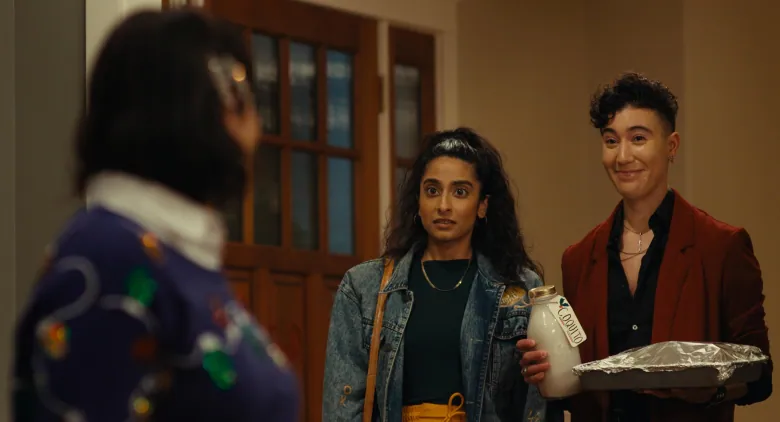A queer, Muslim Christmas
“We are moving towards a world where queer Muslims can confidently tell their stories, one’s that don’t revolve around trauma and conflict.”
“Is it a happy ending, or do they dramatically die?”
“Sort of..? The dead guy’s family accepts his gay male lover in the end, drawn together by grief and mourning. That’s kind of happy?” We considered while trying to choose a movie to watch.
We ended up watching The Office instead. Oscar was a gay man of colour, we reasoned. I did feel a little honour-bound to support queer cinema, even if it was darkly depressing and not at all an escape from the existential quagmire that is to exist and be gay. But The Office would make a room full of gays very happy, someone would point out. And isn’t that what queer movie nights were all about, after all?
Queer movies very often failed to pass the ‘happy ending, non-tragic’ litmus test we imposed in our little club. I remember the dark days of the early to mid 2000’s, when satisfying representation was almost exclusively found in the darker, dustier corners of the internet, confined to tumblr posts and fanfiction embellished with explicitly queer, people of colour (POC) narratives. We compulsively filled in the blanks where media failed, inserting ourselves in the worlds we loved and furiously dissecting subtext for any crumb of gay tossed our way (quite magnanimously).
Nuanced, culturally-informed representation was rare, and queer, culturally-situated representation rarer still. So, to have come to a historical point in time where The Syed Family Xmas Eve Game Night can exist feels monumental. First of all, the title reads like a tumblr wish fulfillment fever-dream, which is a very good thing. The short film is a feel-good, Christmas rom-com about a queer Muslim woman introducing her partner to her family for the first time, and absolutely no one dies at the end. The central conflict? Her Brown family is intense, hostile to romantic partners, and sort of crazy.
As a Brown person, I can very much attest to this. Decentering a dramatic coming-out storyline is refreshing, and adding a queer twist to the age old ‘who’s coming to dinner’ trope in a searingly Brown context is inspired. On every intellectual level, I agree that queer, Muslim representation is long over-due. Progress is slow, but the days of queer, POC stories being relegated to fringe internet lore are numbered. We beg for crumbs no longer!
Admittedly, on a more visceral, pettier level, I am conflicted. As a gay having committed the grave crime of apostacy, the celebration of queer, Muslim representation does make me a smidge uncomfortable. I was ten when I decided to renounce God (every bit the precocious heathen with a heart of gold). The punishment due to an apostate is traditionally, and quite unequivocally, death. You can maybe sense from whence the discomfort arises.
My best friends in school, all hijabis, daintily side-stepped the issue like a puddle on the sidewalk. They sadly nodded along to my tirades against indiscriminate hair removal, took my queer-coded fanfiction in stride, and accommodated my vegetarianism. But the lesbian elephant in the room, growing alarmingly gayer by the year, was never broached, not even tentatively. Even as I wore a purple tuxedo to prom, sporting a fresh f-boy fade, they marveled at my boldness and assured me I would turn the head of the boy I elected to like that year.
I remember trying to find hadith loopholes so they could come to the school field trips abroad (women aren’t allowed to leave the country without their mehram, or male guardian), some jurisprudential fatwa that could rescue me from sharing a room with the girl who baby-talked to her boyfriend all night (“babyyy I wuuuv you”).
Growing up in a very Muslim country, I didn’t really know what a ‘secular’, progressive Islam could look like. My parents are more Bengali than Muslim, which is to say, they observe what they choose to observe and decry the rest as ‘culturally’ incompatible. Theirs is a faith stitched together by tradition, convenience, and a love for wine. Culture and religion often seemed to be at odds, owing to our (relatively) recent conversion (our ancestors were Hindus a mere two hundred years ago, and the ‘pernicious’ influence persists).
It was only when I came here, to Canada, that I fully grasped the cultural significance of religion. Here, to be a Muslim queer is a forceful declaration of identity, a cultural and ethnic marker that tethers them to their community. It’s a clear stand against erasure in a cultural landscape that paints queer POC as invisible, and if not invisible, miserable.
I am ultimately glad we are moving towards a world where queer Muslims can confidently tell their stories, one’s that don’t revolve around trauma and conflict. Stories where the queer characters are unambiguously happy. Media has been historically hostile to happy Muslims and happy queers, so maybe happy queer Muslims are the most radically revolutionary stance of all.

